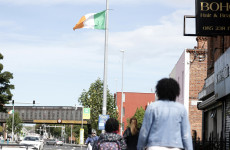Politics
Dublin City Council Faces Backlash Over Irish Flag Controversy

A debate surrounding the use of the Irish flag has emerged this week as Dublin City Council proposed actions in response to the flag’s unexpected display on lampposts across the city. Concerns have been raised that these displays may serve as a form of “territorial marking” rather than expressing genuine patriotism. This controversy has ignited strong reactions from various groups, particularly in light of claims that the flag is being appropriated by anti-immigrant factions seeking to “reclaim” it.
The situation in Ireland mirrors recent developments in the United Kingdom, where similar tensions regarding national symbols have arisen. In both contexts, patriotism is being intertwined with rising anti-migrant sentiments. Taoiseach Micheál Martin stated that Ireland is experiencing a “tipping point” regarding these issues, while Tánaiste Simon Harris emphasized the need to prevent far-right elements from “hijacking” the national flag.
Operation Raise the Colours
The discussion about the Irish flag follows a notable campaign in England, where the Union Jack and the St George’s cross have been prominently displayed in numerous towns and cities. This campaign, dubbed Operation Raise the Colours, began in Birmingham suburbs, where local groups like the Weoley Warriors began draping flags on lampposts. This movement soon spread, resulting in increased visibility of these flags in various urban areas across England.
While these flags can typically be seen during national celebrations or sporting events, their recent proliferation has raised alarms. Historically, such symbols have been misused by far-right organizations since the 1970s. The current environment is no different, as reports indicate that the campaign has led to incidents of vandalism, including the painting of the St George’s cross on church walls and homes.
According to the anti-racism organization Hope Not Hate, the initiative is tied to far-right activists, including Tommy Robinson. Robinson has used social media to rally support for flag campaigns, asserting that those who oppose the display of these flags are “wrong’uns” and “weirdos.” His associate, Andrew Currien, has made claims of distributing millions of flags across the country and is seeking additional funding for this effort.
Emerging Tensions in Ireland
In Ireland, the flag’s appropriation has recently intensified, particularly in areas targeted for housing international protection applicants. The Irish flag has appeared more frequently in neighborhoods such as Finglas, Coolock, and Ballyfermot. Independent Dublin City Councillor Malachy Steenson has voiced strong support for the flag’s display, claiming that those advocating for its removal “despise the Irish nation.”
The controversy gained momentum following Dublin City Council’s consideration of measures to address the flag’s growing visibility. The council’s chief executive, Richard Shakespeare, acknowledged the concerns raised by local communities regarding the flag’s proliferation. This prompted a surge of backlash among far-right groups, who argue that the council’s actions reflect an anti-Irish sentiment.
Presidential hopeful and immigration critic Nick Delehanty has sought to leverage the situation, proposing new laws to prohibit the flying of foreign flags without the Irish flag being present. He has drawn comparisons with Danish laws that regulate flag displays, although the specifics of those regulations do not align precisely with his assertions.
Online discussions have highlighted a growing narrative among far-right factions, portraying Dublin City Council and its officials as oppressors of Irish culture. Some social media users have pointed out instances of foreign flags being flown in prominent locations while sarcastically questioning if other elements of Irish culture might face similar scrutiny.
As the situation continues to evolve, Dublin City Council is set to engage with local groups and law enforcement to navigate the complexities surrounding the flag’s use. The outcome of these discussions may significantly influence how national symbols are interpreted and displayed in the context of rising tensions over immigration in both Ireland and the UK.
-

 Top Stories3 months ago
Top Stories3 months agoTributes Surge for 9-Year-Old Leon Briody After Cancer Battle
-

 Entertainment4 months ago
Entertainment4 months agoAimee Osbourne Joins Family for Emotional Tribute to Ozzy
-

 Politics4 months ago
Politics4 months agoDanny Healy-Rae Considers Complaint After Altercation with Garda
-

 Top Stories4 months ago
Top Stories4 months agoIreland Enjoys Summer Heat as Hurricane Erin Approaches Atlantic
-

 World5 months ago
World5 months agoHawaii Commemorates 80 Years Since Hiroshima Bombing with Ceremony
-

 Top Stories3 months ago
Top Stories3 months agoNewcastle West Woman Patricia Foley Found Safe After Urgent Search
-

 Top Stories5 months ago
Top Stories5 months agoFianna Fáil TDs Urgently Consider Maire Geoghegan-Quinn for Presidency
-

 World5 months ago
World5 months agoCouple Convicted of Murdering Two-Year-Old Grandson in Wales
-

 World5 months ago
World5 months agoGaza Aid Distribution Tragedy: 20 Killed Amid Ongoing Violence
-

 World5 months ago
World5 months agoAristocrat Constance Marten and Partner Convicted of Infant Murder
-

 Top Stories4 months ago
Top Stories4 months agoClimbing Errigal: A Must-Do Summer Adventure in Donegal
-

 Top Stories4 months ago
Top Stories4 months agoHike Donegal’s Errigal Mountain NOW for Unforgettable Summer Views









